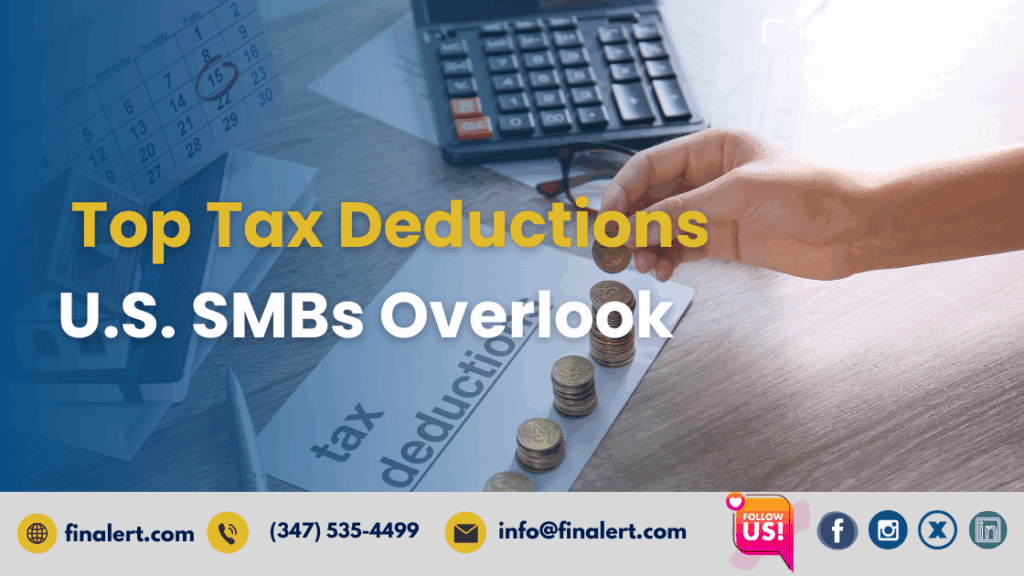
Small and mid-sized businesses (SMBs) are the lifeblood of the U.S. economy, driving innovation, employment, and local development. Yet when it comes to taxes, many SMBs unknowingly leave money on the table. Overlooking legitimate deductions can result in higher tax liabilities, reduced cash flow, and missed opportunities for reinvestment.
Tax laws are complex and ever-evolving, and while most business owners are aware of standard deductions like office rent or payroll, many lesser-known write-offs can significantly lower a company’s tax burden. This article highlights the most commonly overlooked tax deductions U.S. SMBs miss—and offers guidance to help your business take full advantage of what the tax code allows.
Many SMBs incur expenses before officially launching operations. The IRS allows you to deduct up to $5,000 in startup costs and $5,000 in organizational costs, with the remainder amortized over 15 years.
Track every dollar spent before the business starts generating revenue. Separate personal and business expenses from day one.
If you use a personal phone for business calls, emails, or apps, you can deduct the business-use percentage.
Many owners assume that if the phone isn’t dedicated solely to business, it’s not deductible.
If you’re self-employed and not eligible for coverage through a spouse’s employer, you may deduct 100% of health insurance premiums for yourself and your dependents.
Many self-employed owners confuse personal medical expenses with deductible business expenses.
Make premium payments from a business account and retain insurance provider statements as support.
Contributions to retirement plans such as SEP IRAs, Solo 401(k)s, or SIMPLE IRAs can be deducted by SMBs and self-employed individuals.
Some owners assume retirement planning is only for large corporations or don’t realize contributions reduce taxable income.
Set up and fund plans before the extended tax filing deadline (e.g., SEP IRA contributions can be made by October 15 if an extension is filed).
If you use a portion of your home exclusively and regularly for business, you can deduct related expenses.
Many business owners are unsure about the rules and fear triggering an audit.
Use the simplified method ($5 per square foot, up to 300 square feet) or the actual expense method if you maintain detailed records for mortgage/rent, utilities, and insurance.
Premiums paid for business-related insurance policies are deductible. This includes liability, property, and errors and omissions (E&O) coverage.
Some premiums, especially bundled or multi-purpose policies, get categorized incorrectly.
Classify all insurance premiums correctly and consult your broker to break out the business portions of any shared policies.
Expenses paid for legal, accounting, tax preparation, or industry-specific consulting are deductible.
Businesses sometimes forget to include ongoing software subscriptions or memberships.
Costs related to improving business-related skills or knowledge are deductible.
Owners may think only formal degree programs qualify.
Interest paid on business credit cards, lines of credit, or equipment loans is deductible.
If personal credit cards are used for business purchases, the interest may still be partially deductible.
Document business-related purchases and interest charges from mixed-use credit accounts carefully.
Costs for SaaS (Software as a Service), apps, and digital platforms used in business operations are deductible.
Recurring monthly charges from cloud platforms are often considered utilities or missed entirely.
Include platforms like QuickBooks, Zoom, Slack, Microsoft 365, Canva, or CRMs in your deductions.
All expenses related to advertising your business—including print, online, social media, and sponsorships—are fully deductible.
Owners may forget small expenses like boosted social posts, branded swag, or business card printing.
Track all advertising costs by campaign and maintain receipts or ad reports from platforms like Meta Ads or Google Ads.

Business-related meals are 50% deductible, and travel costs for business trips are fully deductible (excluding personal leisure expenses).
Improper documentation or mixing personal and business travel can lead to missed deductions or disallowed claims.
You can deduct the cost of equipment used in your business over time, or take accelerated depreciation (e.g., Section 179 or bonus depreciation).
Some assets are expensed in full when they should be depreciated, or depreciation schedules are never updated.
Gifts to clients, customers, or vendors can be deducted up to $25 per person per year.
The low deduction limit causes some owners to disregard the category entirely.
Franchise taxes, business licenses, gross receipts taxes, and other local obligations are deductible at the federal level.
Owners often focus only on federal taxes or pay these fees irregularly, outside of normal bookkeeping cycles.
Ensure all government payments are categorized properly and reviewed during year-end reconciliation.
Running a small or mid-sized business means juggling numerous responsibilities, and tax planning often falls to the bottom of the list—until it’s too late. Yet many of the deductions outlined here are not only valid but also designed to support business growth and sustainability.
By identifying and claiming overlooked deductions, SMBs can reduce taxable income, reinvest more into operations, and improve year-over-year profitability. The key lies in accurate recordkeeping, consistent expense categorization, and periodic consultation with accounting professionals.
At Finalert, we guide business owners through comprehensive tax planning strategies that unlock value and prevent costly oversights. Understanding these often-missed deductions is the first step toward a more optimized and tax-efficient business operation in 2025 and beyond.
Similar Articles
No results available
Get in touch with Finalert today for tailored business solutions!
No results available
Ready to thrive? Connect with Finalert today and let’s succeed together in the dynamic global market.
© 2025 Finalert. All rights reserved.
Ready to grow with confidence and clarity?
Finalert delivers high-quality accounting, financial advisory, and analytics services tailored to growing businesses providing control, visibility, and decision-ready insight to support sustainable success.
Address
Our Services
Accounting Services
Advisory Services
Industries
Quick Links
© 2026 Finalert® LLC. All Rights Reserved.